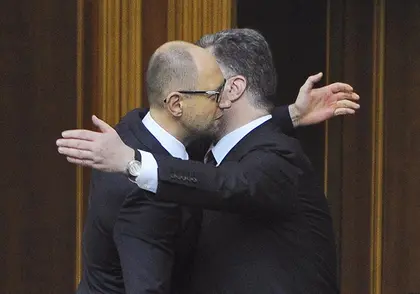There is no clear answer to that yet.
On Oct. 29, both top winners of the election, President Petro Poroshenko’s Bloc and President Arseniy Yatsenyuk’s Front of Change, presented competing drafts of an agreement to unite forces into a ruling coalition.
JOIN US ON TELEGRAM
Follow our coverage of the war on the @Kyivpost_official.
While Poroshenko’s Bloc won the biggest number of seats, thanks to a strong showing in the single-mandate constituencies, Yatsenyuk’s party had the highest score in the party race. Altogether, six parties crossed the 5 percent threshold to get into parliament. With the many new faces, an assortment of holdovers or new legislators who supported the fugitive former President Viktor Yanukovych also got elected.
Poroshenko’s version of the coalition agreement was a 50-page document that outlined plans across the spectrum, everything from battling corruption to pension reform.
But Yatsenyuk, who is expected to keep his job, proposed his own just a few hours later. His plan was more concise, just 2.5 pages. It’s called the European Ukraine, and implies that the plan is basically to fulfill the nation’s commitments to change that came with the signing of the Association Agreement, a comprehensive trade-and-political pact with the European Union. In addition, Yatsenyuk presented a list of 36 laws that need to be adopted.
This battle of platforms was one of the first signs that relations between Poroshenko and Yatsenyuk are far from smooth and raised fears that their rivalry might turn destructive.
It did not help that, as Yatsenyuk was presenting his platform, Deputy Prime Minister and Poroshenko loyalist Volodymyr Hroisman came out with an alternative news conference to invite other pro-European winners to join the coalition initiated by the presidential camp.
The leader of the Batkivshchyna Party, Yulia Tymoshenko, formerly Yatsenyuk’s party boss, followed with a statement that her political force is ready to join the coalition.
Lviv Mayor Andriy Sadoviy’s Samopomich says his group has one ambition – it wants unity and it wants the Yatsenyuk and Poroshenko forces to be together. “And we’re doing everything in our power to make this happen. Unity is what the Ukrainian people want,” Sadoviy said.
Political peacemakers have arrived on the scene as some worry that the Poroshenko-Yatsenyuk rivalry could become as paralyzing as the one between former President Viktor Yushchenko and Tymoshenko as prime minister after the 2004 Orange Revolution.
Oleksiy Khmara, head of Transparency International Ukraine, said his pro-transparency watchdog’s ideas are worth uniting behind.
“We’re calling on participants of the coalition to use our legislative suggestions, which are based on a detailed analysis of existing Ukrainian law and international recommendations,” Khmara said.
Impatience is also building over the lack of progress by the Yatsenyuk government since it came to power in February.
Viktor Andrusiv, a Kyiv-based political scientist, says Yatsenyuk does not understand the difference between the paper and the practical implementation of reforms.”
He said Hroysman, who had been a successful mayor of Vinnytsia, may have been a better prime minister because he knows how to govern.
There are also high expectations from the so-called EuroMaidan generation of political newcomers in the new parliament. They are now negotiating to form a cross-party reform platform.
Samoponich, which came third in the race, is filled with new faces who worked on the Reanimation Reform Package, a public initiative that was designed to push new laws and big changes.
Many hope that these relative youngsters – some in their 20s and 30s – will upend the corrupt-as-usual politics. “They will stimulate reforms and competition of ideas inside the democratic camp,” says Oleksiy Haran, professor of political studies at Kyiv-Mohyla Academy.
One of these new parliament members, ex-journalist Mustafa Nayyem, says activists in parliament can become powerful players. “The old guard will not want to fight with us as they will get huge reputation damage and will have to make concessions,” Nayyem says.
This group’s agenda includes stripping parliament members of immunity from prosecution, changing the electoral system to party lists only, creating public television and undercutting the financial power of oligarchs through public financing of political parties.
Editor’s Note:This article is part of the Kyiv Post’s Reform Watch project, sponsored by the International Renaissance Foundation. Content is independent of the financial donors. The newspaper is grateful to the sponsors for supporting Ukraine’s free press and making specialized coverage of reforms possible through this project.
You can also highlight the text and press Ctrl + Enter



